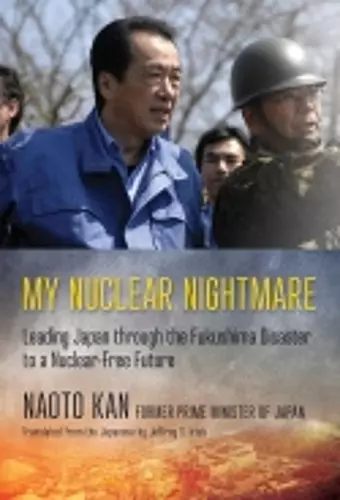My Nuclear Nightmare
Leading Japan through the Fukushima Disaster to a Nuclear-Free Future
Naoto Kan author Jeffrey S Irish translator
Format:Hardback
Publisher:Cornell University Press
Published:10th Jan '17
Currently unavailable, and unfortunately no date known when it will be back

"Naoto Kan, who was prime minister of Japan when the March 2011 Fukushima nuclear disaster began, has become a ubiquitous and compelling voice for the global antinuclear movement. Kan compared the potential worst-case devastation that could be caused by a nuclear power plant meltdown as tantamount only to ‘a great world war. Nothing else has the same impact.’ Japan escaped such a dire fate during the Fukushima disaster, said Kan, only ‘due to luck.’ Even so, Kan had to make some steely-nerved decisions that necessitated putting all emotion aside. In a now famous phone call from Tepco, when the company asked to pull all their personnel from the out-of-control Fukushima site for their own safety, Kan told them no. The workforce must stay. The few would need to make the sacrifice to save the many. Kan knew that abandoning the Fukushima Daiichi site would cause radiation levels in the surrounding environment to soar. His insistence that the Tepco workforce remain at Fukushima was perhaps one of the most unsung moments of heroism in the whole sorry saga."—The Ecologist
On March 11, 2011, a massive undersea earthquake off Japan’s coast triggered devastating tsunami waves that in turn caused meltdowns at three reactors in the Fukushima Daiichi Nuclear Power Plant. Ranked with Chernobyl as the worst nuclear disaster in history, Fukushima will have lasting consequences for generations. Until 3.11, Japan’s Prime Minister, Naoto Kan, had supported the use of nuclear power. His position would undergo a radical change, however, as Kan watched the nuclear disaster at the Fukushima No. 1 Power Plant unfold and came to understand the potential for the physical, economic, and political destruction of Japan.
In My Nuclear Nightmare, Kan offers a fascinating day-by-day account of his actions in the harrowing week after the earthquake struck. He records the anguished decisions he had to make as the scale of destruction became clear and the threat of nuclear catastrophe loomed ever larger—decisions made on the basis of information that was often unreliable. For example, frustrated by the lack of clarity from the executives at Tepco, the company that owned the power plant, Kan decided to visit Fukushima himself, despite the risks, so he could talk to the plant’s manager and find out what was...
Naoto Kan, who was prime minister of Japan when the March 2011 Fukushima nuclear disaster began, has become a ubiquitous and compelling voice for the global antinuclear movement. Kan compared the potential worst-case devastation that could be caused by a nuclear power plant meltdown as tantamount only to 'a great world war. Nothing else has the same impact.' Japan escaped such a dire fate during the Fukushima disaster, said Kan, only ‘due to luck.’ Even so, Kan had to make some steely-nerved decisions that necessitated putting all emotion aside. In a now famous phone call from Tepco, when the company asked to pull all their personnel from the out-of-control Fukushima site for their own safety, Kan told them no. The workforce must stay. The few would need to make the sacrifice to save the many. Kan knew that abandoning the Fukushima Daiichi site would cause radiation levels in the surrounding environment to soar. His insistence that the Tepco workforce remain at Fukushima was perhaps one of the most unsung moments of heroism in the whole sorry saga.
* The Ecologist *This worthwhile account of the Fukushima nuclear disaster was written by former Japanese Prime Minister Naoto Kan, who served during that time.... This excellent work provides thorough detail about the Fukushima disaster from the eyes of a political leader. To any individual who thinks governing is easy or that lack of governance is possible in the modern world, this book is a necessary revelation. Summing Up: Recommended. All readers.
-- A. M. Saperstein, Wayne State University * CHOICE *Voluminous literature on the Fukushima nuclear disaster has been published, but My Nuclear Nightmare might be one of the most important primary sources to be translated into English.... The book is interesting in many research contexts. Scholars who are interested in crisis management, risk communication, the prime minister's political leadership, media coverage of the prime minister, nuclear regulatory authority, renewable energy policy, and ethical issues such as the lives of nuclear power plant workers, will find the book engaging.
* Pacific AffaiISBN: 9781501705816
Dimensions: 216mm x 140mm x 22mm
Weight: 454g
200 pages